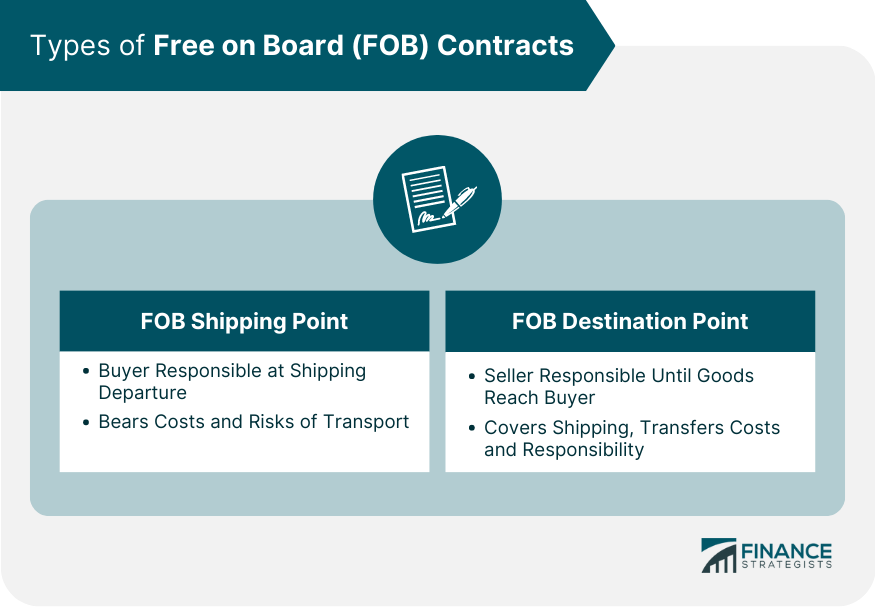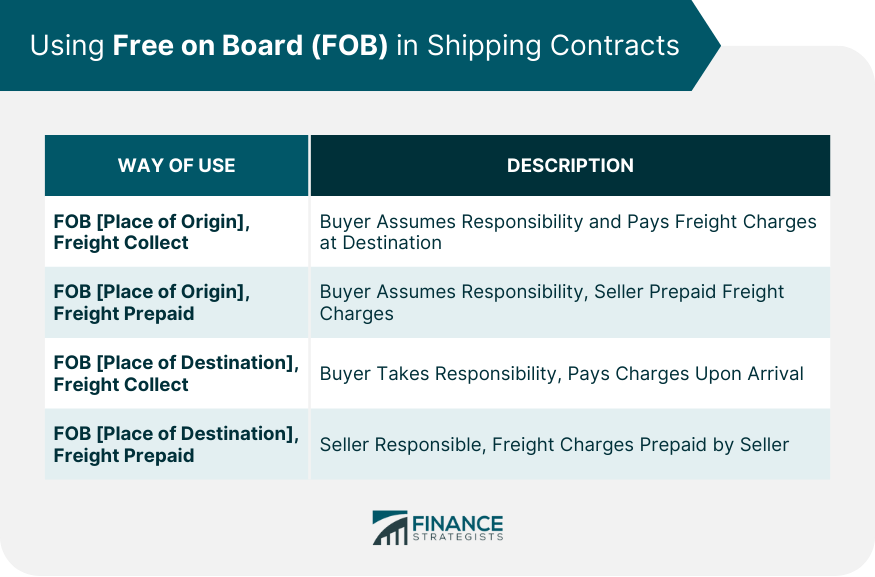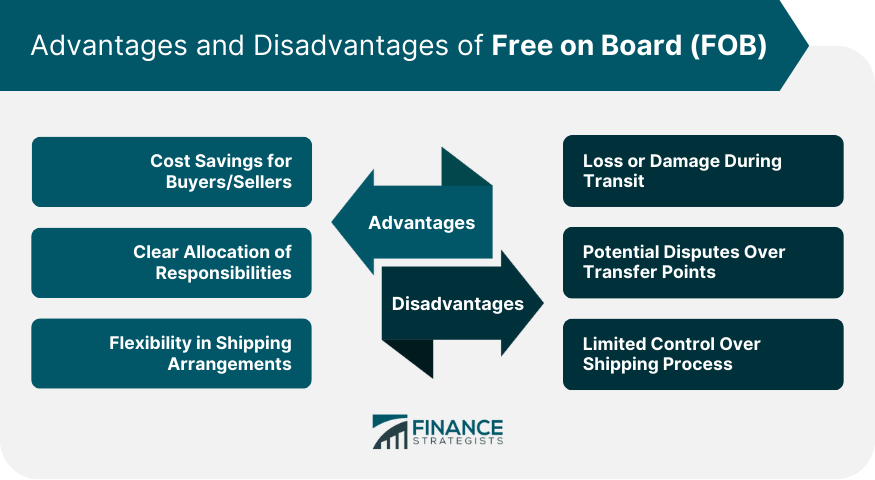Free on Board, commonly referred to as F.O.B., is a shipping designation used to specify obligations and responsibilities for goods when they are shifted from seller to buyer as sea freight. FOB is part of the incoterms list published by the International Chamber of Commerce. These terms are used to standardize shipping and freight contracts and avoid lengthy negotiations by expressing contractual obligations in simple phrases. Specifically, FOB indicates at which point the responsibility (and risk) of the shipped goods transfers from the seller to the buyer. Understanding this term is vital as it affects the pricing, risk management, and logistics aspects of international trade. Generally, FOB is generally specified in a sales agreement and is accounted for under inventory costs. In classic FOB contracts, sellers are relieved of responsibility and costs for their goods, once the goods are loaded onto a container ship. "FOB Shipping Point" or "FOB Origin" implies that the buyer assumes responsibility for the goods, including payment of shipping costs and risk of loss, once the goods leave the seller's premises. In simpler terms, the moment the goods are on the shipping truck or vessel, the seller's obligations are considered fulfilled, and the buyer takes over. The buyer then bears all costs and risks associated with transporting the goods to their final destination. Contrastingly, "FOB Destination Point" means the seller retains responsibility for the goods until they reach the buyer's location or another agreed-upon destination. The seller covers the shipping costs and remains accountable for the goods during their transit. Only upon delivery, at the predetermined destination, do the costs and responsibilities transfer to the buyer. There are four different ways of using FOB in shipping contracts: FOB [Place of Origin], Freight Collect indicates that the buyer has assumed responsibility for the freight at its origin and will pay associated freight charges at the destination. FOB [Place of Origin], Freight Prepaid indicates that the buyer has assumed responsibility for the freight at its origin and the seller has paid for the freight charges. FOB [Place of Destination], Freight Collect indicates that the buyer will take responsibility for the freight only after it reaches the destination and will pay associated freight charges at the destination. FOB [Place of Destination], Freight Prepaid indicates that the seller is responsible for the freight during the shipping process and the associated freight charges have already been prepaid by them. FOB is important because it has shipping liability and accounting implications. It assigns shipping costs responsibility for freight items. It assigns liability costs and accountability for freight items. In the previous example, the buyer may end up paying double charges if they return a damaged shipment back to the seller for a freight marked as FOB [Place of Origin]. It has accounting implications because the seller can book costs for goods sold earlier if they are marked FOB [Place of Origin]. In an FOB Shipping Point agreement, the transfer of ownership happens the moment the goods are loaded onto the transportation vehicle at the seller's location. From this moment, the buyer is legally the owner of the goods and is responsible for any potential loss or damage that might occur during the transit. For FOB Destination Point agreements, ownership transfers at the opposite end of the journey. Only once the goods have safely reached their intended destination does the ownership transfer from the seller to the buyer. Throughout the transportation process, the seller remains the legal owner of the goods. Incoterms (International Commercial Terms) are a set of internationally recognized standards that define the roles of buyers and sellers in the transfer of goods in international and domestic trade. FOB is one of these Incoterms, specifically tailored for maritime transport. Incoterms aim to simplify international trade by offering a standardized set of terms, reducing misunderstandings and disputes. While FOB is popular, it's only one of the various Incoterms available. Other terms, like CIF (Cost, Insurance, and Freight) or EXW (Ex Works), offer different arrangements regarding costs, responsibilities, and risk points. For example, under CIF, the seller also provides insurance for the goods during the journey, unlike FOB. The selection of an appropriate Incoterm, including FOB, depends on the specifics of the trade deal. Factors like the mode of transportation, the nature of the goods, the relationship between the buyer and seller, and individual preferences can all influence the choice of term. It's crucial to understand each Incoterm's nuances and consult experts if needed to make an informed decision. In FOB Shipping Point agreements, buyers, due to their potential volume of shipments or pre-established relationships with freight carriers, might be able to negotiate more favorable shipping rates or conditions. On the other hand, in FOB Destination Point contracts, sellers might also harness similar advantages, especially if they have economies of scale in their shipping operations or can combine multiple shipments to different buyers. A standout advantage of FOB terms is the clarity they bring to the trading table. With clearly defined points for risk and cost transfer, both parties can better understand and plan for their respective responsibilities. This clear delineation can significantly reduce misunderstandings, misinterpretations, and consequently, potential disputes that could arise from ambiguities. For buyers, FOB, especially the FOB Shipping Point, presents an opportunity to exert more control over the shipping process. They can select carriers based on their past experiences, preferences for service quality, or even route efficiencies. This can be particularly beneficial when handling specialized goods, navigating congested shipping lanes, or managing a tight supply chain that requires precise timing. FOB, while advantageous in many ways, comes with inherent transit risks, especially for the party responsible during the shipping. For FOB Shipping Point agreements, the buyer assumes the risk almost immediately after the transaction starts, which can be unnerving, especially for high-value goods or volatile shipping routes. The specificity required in FOB agreements can sometimes be its Achilles heel. If the transfer point isn't meticulously defined, documented, and understood by both parties, it can lead to disputes. Such disagreements, especially when goods are in transit or have already been delivered, can be both financially and operationally taxing. In FOB Destination Point agreements, buyers often feel they're in a passenger seat. The entire shipping process, from carrier selection to route decisions, is in the seller's hands. This can sometimes lead to inefficiencies, especially if the seller doesn't have the same urgency or operational standards as the buyer. Free on Board (FOB) is a shipping designation in international trade, indicating the point at which responsibilities and risks of goods transfer from seller to buyer. The concept, outlined in the Incoterms list by the International Chamber of Commerce, streamlines shipping contracts and facilitates trade negotiations. FOB offers flexibility, cost savings, and clear allocation of responsibilities. However, it also entails drawbacks, including the potential for disputes over transfer points, limited control over the shipping process, and inherent risks of loss or damage during transit. Understanding the nuances of FOB is paramount for businesses engaged in international trade, as it directly influences pricing, risk management, and logistical strategies. By grasping the intricacies of FOB, businesses can navigate the complexities of global commerce more effectively, ensuring smoother transactions and better risk mitigation.Free on Board (FOB) Definition
Types of FOB Contracts
FOB Shipping Point
FOB Destination Point

Using FOB in Shipping Contracts

FOB Explanation
For example, goods marked FOB [Place of Origin] become the responsibility of the buyer during the shipping process and they are responsible for paying charges associated with moving the items from origin to destination.
In such cases, the buyer will also have to buy insurance to recover shipment costs.FOB and Transfer of Ownership
Point of Transfer in FOB Shipping Point
Point of Transfer in FOB Destination Point
FOB and Incoterms
Advantages of FOB
Cost Savings for Buyers/Sellers
Clear Allocation of Responsibilities
Flexibility in Shipping Arrangements
Disadvantages of FOB
Loss or Damage During Transit
Potential Disputes Over Transfer Points
Limited Control Over Shipping Process

Conclusion
Free on Board (FOB) FAQs
FOB stands for Free on Board.
Free on Board is a shipping designation used to specify obligations and responsibilities for goods when they are shifted from seller to buyer as sea freight.
In classic FOB contracts, sellers are relieved of responsibility and costs for their goods, once the goods are loaded onto a container ship.
Generally, FOB is specified in a sales agreement and is accounted for under inventory costs.
FOB is important because it has shipping, liability, and accounting implications.
True Tamplin is a published author, public speaker, CEO of UpDigital, and founder of Finance Strategists.
True is a Certified Educator in Personal Finance (CEPF®), author of The Handy Financial Ratios Guide, a member of the Society for Advancing Business Editing and Writing, contributes to his financial education site, Finance Strategists, and has spoken to various financial communities such as the CFA Institute, as well as university students like his Alma mater, Biola University, where he received a bachelor of science in business and data analytics.
To learn more about True, visit his personal website or view his author profiles on Amazon, Nasdaq and Forbes.















